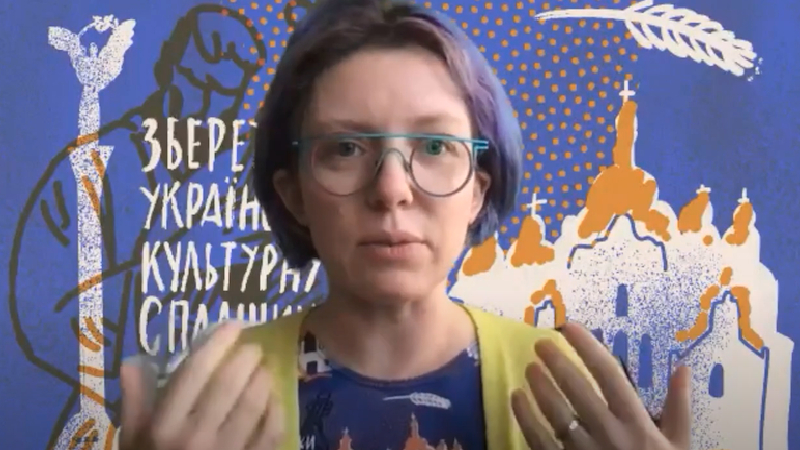
Charleston In Between – In the News: Ukraine
By Alex Thomas, MALD 2023 Candidate, The Fletcher School
On May 11, 2022, as part of their “In the News” segment, the Charleston Hub organization held a virtual panel to discuss the war in Ukraine. Traditionally an annual conference held in November, this unique virtual conference was meant to cover the latest developments of the war in Ukraine that couldn’t wait until the November conference.
The panel consisted of five different speakers and was moderated by Ann Okerson, Senior Advisor for the Center for Research Libraries. Ms. Okerson opened the panel discussion with a brief introduction and background for the war in Ukraine which began on February 24, 2022, and touched on her personal history as an immigrant from Ukraine. She then introduced the first speaker for the panel, Dr. Tetiana Yaroshenko, who is the Vice-President for Research and IT at the National University of Kyiv-Mohyla Academy in Ukraine.
Dr. Yaroshenko’s presentation began with a background of the Kyiv-Mohyla Academy, and transitioned into how academic institutions in Ukraine during the war have been able to continue their functions. It included a PowerPoint presentation with images from the war in Ukraine, during which Dr. Yaroshenko spoke about the evolving role of libraries and universities in the war.
“Once centers of science and progress, many libraries and universities throughout Ukraine are now serving as refugee centers; librarians and teachers are now bringing books to metro bomb shelters so learning can continue,” Dr. Yaroshenko said.
“This war in Ukraine is not only about stopping Russia, but it is also about defending our common values in Europe and the world,” she further added.
After Dr. Yaroshenko’s presentation, Kent Lee was introduced and spoke about his organization, East View Information Services (EVIS), and its operations in Russia and Ukraine during the war. Started in 1989, EVIS is a global provider for libraries all over the world on translated foreign language information products.
During his presentation, Lee spoke about the disruption that the war has caused for the Ukrainian employees of EVIS and how its global services for scholars and librarians abroad have been interrupted as well.
“There’s a new wave of applications for new ISBNs, and I suspect there will be a tremendous amount of new publishing for this new story. You know, we thought the [Covid-19] pandemic would be the story of our lifetimes here, but I think the war in Ukraine has become that story,” Lee further explained.
Ms. Okerson then introduced Gwen Evans, the Vice President of Global Library Relations at Elsevier. Evans spoke about how publishers have responded in terms of continuing or withdrawing their services in Russia, and broadly about the challenges of being a publisher during wartime.
“Like many other publishers, we have suspended all sales and marketing within Russia, except a few clinician services which are providing patient care which is in accordance to the complex, multifaceted, and multigovernmental sanctions on Russia,” she said.
“With this in mind, it’s a challenging predicament when the goal of scientific progress depends on openness and the free flow of information. As Kent mentioned, cutting off outside information for scholars and researchers within Russia may have an unintended effect of creating an echo chamber there,” she further added.
After Evans’ remarks, Ms. Okerson then introduced Quinn Dombrowski, the Academic Technology Specialist at the Division of Literatures, Cultures, Languages, and the Library at Stanford University. Dombrowski mentioned a project she is working on titled SUCHO (Saving Ukrainian Cultural History Online).
“The project seeks to preserve some of the most crucial parts of Ukrainian culture and history. With over 400 volunteers, I think it really sheds a spotlight on the ways that people can act and how those ways differ from the way institutions act,” Dombrowski said.
“A lot of the work that stands to be done here is ensuring that these online museum archives like SUCHO make their way into the pipelines which are regularly archived. Thinking of ways we can make this infrastructure more resilient is going to be a key part of this moving forward.”
The panel then turned to its last member, Arik Burakovsky, the Assistant Director of the Russia and Eurasia Program at the Fletcher School. Burakovsky’s presentation focused particularly on how the war in Ukraine has impacted research and higher education. He offered a brief background of the Fletcher School, and spoke about his work managing the Russia and Eurasia Program and the program’s initiatives for strengthening U.S.-Russia relations through various partnerships.
“We started this initiative as a response to Russia’s annexation of Crimea when the initial war broke out in Ukraine. The idea was to address the rising tensions between the United States and Russia, which are now perhaps worse than they were during the Cold War,” Burakovsky said.
“The goal of these partnerships with Russian institutions was to use scholarship and open dialogue to promote the rule of law in Russia, and to build mutual understanding and trust among current and future experts and practitioners in both countries,” Burakovsky added.
He then spoke about the dangers of cutting off Russian academia from the outside world and the implications it has on shifting perceptions amongst young academics in Russia away from the West.
“Given the ramped up political oppression and censorship in Russia, thousands of academics who opposed the war must now choose between staying silent, with risks of employment termination, fines, and even jail sentences up to 15 years, or fleeing the country, as we have seen hundreds of thousands of Russians leaving Russia,” Burakovsky said.
The panel then concluded with a closing question from Ms. Okerson about the responsibilities that academics, practitioners, and individuals have to get through the war in Ukraine. Each panelist spoke for roughly a minute, but collectively echoed the sentiment of how crucial it is to stay informed about what’s happening not only in the context of the war but also within Russian society.
